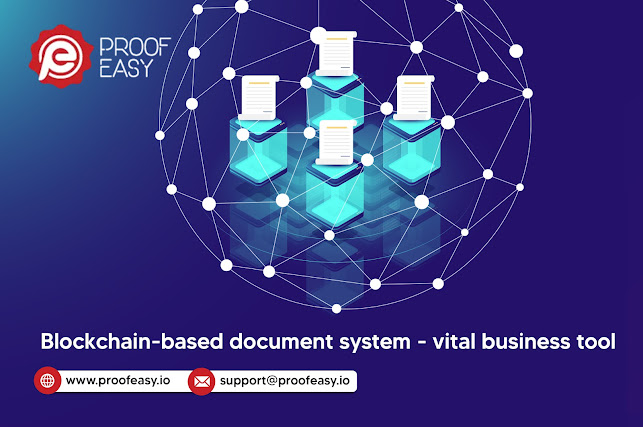How to Secure File Sharing with Blockchain?
In today's digital age, secure file sharing has become a crucial aspect of business operations. Protecting sensitive information from unauthorized access and ensuring data integrity are paramount concerns for organizations worldwide.
Blockchain
technology, with its decentralized and immutable nature, offers a
promising solution to enhance file sharing security. Over the years, there have
been many pioneering platforms such as ProofEasy that harnesses the power of
this progressive tech to manage documents securely including file sharing.
In
this blog, we will explore how blockchain can be utilized to secure file
sharing and discuss real-life case studies that highlight its practical
applications.
Understanding Blockchain and its Benefits in File Sharing
Before
diving into the case studies, let's briefly explore how blockchain works and
the advantages it brings to secure file sharing -
Decentralization: Blockchain eliminates the need for a central authority by
distributing data across a network of nodes. The distributed ledger in
blockchain ensures that no single entity has control over the entire
system, reducing the risk of data breaches.
Immutable Data:
Once data is recorded on the blockchain, it becomes virtually tamper-proof.
This characteristic makes it ideal for maintaining the integrity of shared
files and preventing unauthorized modifications.
Cryptographic Security: Blockchain utilizes advanced
cryptographic algorithms to secure transactions and data transfers. Hence,
resulting in only authorized parties with the necessary cryptographic keys to
access and interact with the shared files.
Some Case Studies Highlighting Use of Blockchain for Secure File Sharing
Guardtime and Estonian Government
Guardtime,
a blockchain company, partnered with the Estonian government to secure the
integrity of their digital assets and data. They implemented a blockchain-based
system called Keyless Signature Infrastructure (KSI).
KSI
allows the Estonian government to ensure the authenticity and integrity of
their files, such as health records and national databases, by timestamping and
hashing them on the blockchain. This prevents unauthorized tampering or
modifications to the shared files, providing a robust level of security.
IPFS and Filecoin
The
InterPlanetary File System (IPFS) and Filecoin, both built on blockchain
technology, offer decentralized and secure file sharing. IPFS enables
distributed file storage and retrieval, while Filecoin incentivizes users to
contribute their storage resources to the network.
With
this collaboration, files are securely stored and accessed through a
decentralized network of nodes. Therefore, reducing reliance on centralized
servers and enhancing file sharing security.
IBM Food Trust
IBM
Food Trust is a blockchain-based platform that improves transparency and
traceability in the food supply chain. It allows participants, such as farmers,
suppliers, and retailers, to securely share information and track the journey
of food products from farm to table. By leveraging blockchain's immutable and
transparent nature, IBM Food Trust helps prevent fraud, contamination, and
unauthorized access to sensitive data, ensuring safer food for consumers.
Best Practices for Implementing Blockchain in File Sharing
·
Choose
the right blockchain platform or build your own private blockchain network
based on your organization's needs.
·
Encrypt
files before storing them on the blockchain to add an extra layer of security.
·
Define
access controls and permissions to ensure that only authorized parties can
access the shared files.
·
Regularly
monitor and update your blockchain network to address any vulnerabilities or
security risks.
·
Educate
employees and users about the benefits and proper usage of blockchain for
secure file sharing.
Conclusion
Blockchain
technology offers an innovative approach to secure file sharing, providing
enhanced data integrity, decentralization, and cryptographic security.
The real-life case studies mentioned above demonstrate the practical
applications of blockchain in securing sensitive files and information.
With
the adoption of best practices and leveraging blockchain's capabilities,
organizations can strengthen their file sharing processes. Embracing blockchain
technology represents a significant step forward in the quest for robust and
secure file sharing solutions.




Comments
Post a Comment